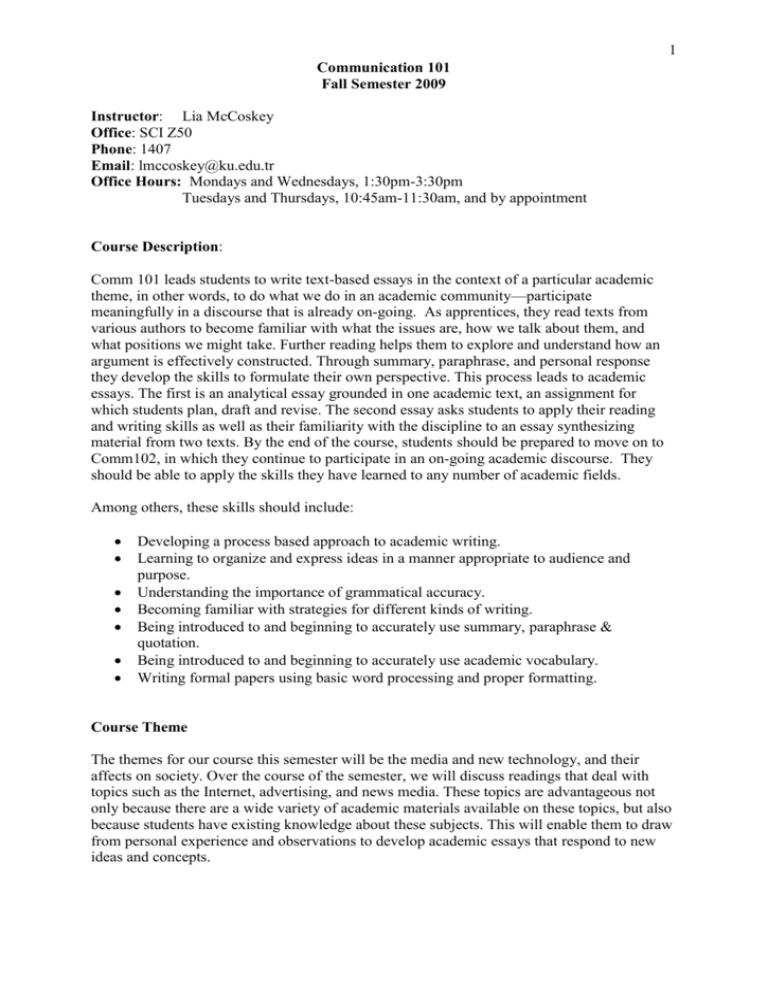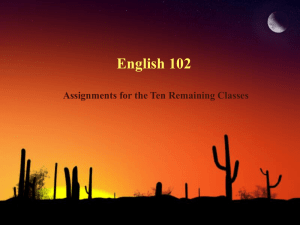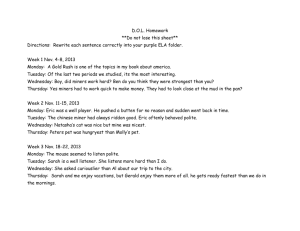Fall Semester 2009
advertisement

1 Communication 101 Fall Semester 2009 Instructor: Lia McCoskey Office: SCI Z50 Phone: 1407 Email: lmccoskey@ku.edu.tr Office Hours: Mondays and Wednesdays, 1:30pm-3:30pm Tuesdays and Thursdays, 10:45am-11:30am, and by appointment Course Description: Comm 101 leads students to write text-based essays in the context of a particular academic theme, in other words, to do what we do in an academic community—participate meaningfully in a discourse that is already on-going. As apprentices, they read texts from various authors to become familiar with what the issues are, how we talk about them, and what positions we might take. Further reading helps them to explore and understand how an argument is effectively constructed. Through summary, paraphrase, and personal response they develop the skills to formulate their own perspective. This process leads to academic essays. The first is an analytical essay grounded in one academic text, an assignment for which students plan, draft and revise. The second essay asks students to apply their reading and writing skills as well as their familiarity with the discipline to an essay synthesizing material from two texts. By the end of the course, students should be prepared to move on to Comm102, in which they continue to participate in an on-going academic discourse. They should be able to apply the skills they have learned to any number of academic fields. Among others, these skills should include: Developing a process based approach to academic writing. Learning to organize and express ideas in a manner appropriate to audience and purpose. Understanding the importance of grammatical accuracy. Becoming familiar with strategies for different kinds of writing. Being introduced to and beginning to accurately use summary, paraphrase & quotation. Being introduced to and beginning to accurately use academic vocabulary. Writing formal papers using basic word processing and proper formatting. Course Theme The themes for our course this semester will be the media and new technology, and their affects on society. Over the course of the semester, we will discuss readings that deal with topics such as the Internet, advertising, and news media. These topics are advantageous not only because there are a wide variety of academic materials available on these topics, but also because students have existing knowledge about these subjects. This will enable them to draw from personal experience and observations to develop academic essays that respond to new ideas and concepts. 2 Course Requirements & Grading: Two formal academic essays: drafts, revisions, and final drafts 50% Essay One: The essay should demonstrate understanding of a specified text and provide a thoughtful response to that text. This might be thought of as synthesizing your prior knowledge with your acquired knowledge. The essay should selectively summarize material from the text and provide a response, while substantially referring to the text. In addition, in this essay you must apply ideas from the text to your own experiences and observations, and you must take a position (by either agreeing or disagreeing) towards the author’s central argument and explaining your reasoning. A detailed description of the essay assignment will be handed out in class. Essay Two: In this essay, your response should demonstrate a synthesis of two texts. The essay should summarize relevant parts of two texts, compare and contrast parts of the authors’ arguments. Along with these requirements, you must apply the concepts from the articles to a specific case study. A detailed description of the essay assignment will be handed out in class. In-class Writing Assignment 10% For the in-class writing assignment, you will be given an article (in advance), and will be asked to write a response to the article during class time. On the day of the in-class assignment, you will receive a detailed writing prompt that outlines the demands of the assignment. Formal Writing Exercises and Homework Oral Component Participation, Quizzes 20% 10% 10% Grading Criteria: Compositions will be graded based on the following criteria: Content: Organization and Development: Grammar and vocabulary 40% 30% 30% Note: All assignments done outside of class must be typed, double-spaced, spell checked, printed on A4 paper, completed on time AND they must be your own work. Required Course Materials: 1. Hacker, Diana. Rules for Writers 6th Edition Bedford Books (9780312452766) Available at the bookstore 3 2. Course Packet – This is available in the Xerox center of the library (located on bottom floor). Your course packet will be under your instructor’s name. 3. English/English dictionary 4. Binder 5. Writing Implements: pen or pencil, eraser, notebook 6. Stapler Class Attendance And Participation: Class attendance is required. You are allowed 3 absences excused or unexcused from class without penalty. Each following absence, whether it is excused or unexcused, results in a reduction of your overall course grade: 4 absences = 5% penalty, 5 = 10%, 6 = 15%, 7= 20%. If you miss more than 7 classes, you will automatically fail the course. Consult with your instructor if you believe there are extenuating circumstances. I value active participation highly, as communication and discussion are fundamental to successful writing. Classroom discussions allow us to explore the ideas expressed by the authors we read. In our class discussions of readings, our workshops, our peer review sessions, and our online interactions, you will have many opportunities to raise questions and express differing points of view in thoughtful ways, listening actively and respectfully to the ideas of others and engaging with the course material to work out your own ideas. Plagiarism and collusion Policy: Plagiarism is presenting someone else's words or ideas as your own, without proper reference. Plagiarism will not be tolerated. You are graded on your own individual work, not another's masquerading as your own. Any student found plagiarizing on or colluding in writing assignments may fail the assignment, fail the course, and/or be referred to the university's disciplinary council. This may result in suspension from the university. You commit plagiarism when: You copy someone else's writing and do not put it in quotation marks and identify the source. You take someone else's writing, change some of the words, and do not identify the source. You take someone else's ideas or sequence of ideas, put them into your own words, and do not identify the source. Someone else writes your assignments or changes your writing and thus creates a false impression of your abilities. You engage in collusion when: You receive unauthorized help with your writing by paying or otherwise inducing another person to do the writing for you. Grading Scale: A = 100 – 93% A- = 92 – 90% B+ = 89 - 87% B = 86 - 83% C+ = 79 - 77% C = 76 – 73% D+ = 69 - 67% D = 66 – 60% F = 59 – 0% 4 B- = 82 – 80% C- = 72 – 70% Course Guidelines and Expectations: Come to class prepared to respond to readings to contribute to discussion Behave respectfully toward the instructor and fellow students Submit neat and Professional work Keep up with work and expectations Turn cell phones OFF during class COMMUNICATION 101 Fall 2009, Class Schedule This schedule may be revised as necessary throughout the semester. Changes to the schedule will be announced in class. When readings are due, I expect you to come to class prepared for a reading response quiz and ready to participate in our discussions. You are responsible for adhering to this schedule and meeting all deadlines. Week 1: Monday, Sept. 28 to Wednesday, Sept. 30 First week of class! Introductions, policies and expectations Week 2: Monday, Oct. 5 Reading: “’They Say’: Starting with What Others Are Saying,” and Cardona, “Vanity, They Name is… Man?” Wednesday, Oct. 7 Reading: “’Her Point Is’: The Art of Summarizing” Week 3: Monday, Oct. 12 Reading: “’Yes/No/Okay, But’: Three Ways to Respond” Wednesday, Oct. 14 Reading: Qualter, “The Social Role of Advertising” Week 4: Monday, Oct. 19 Wednesday, Oct. 21 In-class Writing Assignment Reading: Berger, “Sex as Symbol in Fashion Advertising,” “Checklist for Analyzing Print Advertisements,” and “A Primer on Analyzing Television Commercials” Week 5: Monday, Oct. 26 Draft of Assignment 1 Due for Peer Review Reading: “’As He Himself Puts It’: The Art of Quoting” Wednesday, Oct. 28 No Class: Anniversary of the Turkish Republic 5 Week 6: Monday, Nov. 2 First Draft of Assignment 1 Due Wednesday, Nov. 4 Reading: Solomon, “Masters of Desire: The Culture of American Advertising” Week 7: Monday, Nov. 9 Reading: Flora, “Mood Tools: High-Tech Tethers” Wednesday, Nov. 11 Conferences Week 8: Monday, Nov. 16 Second Draft of Assignment 1 Due Wednesday, Nov. 18 Reading: Stoll, “Isolated by the Internet” Week 9: Monday, Nov. 23 Reading: Thompson, “Web Ushers in Age of Ambient Intimacy” Wednesday, Nov. 25 Conferences Week 10: Monday, Nov. 30 Reading: Tyler, “Is the Internet Changing Social Life?” (first five pages) Wednesday, Dec. 2 Rough Draft of Assignment 2 Due for Peer Review Reading: Tyler, “Is the Internet Changing Social Life?” (last five pages) Week 11: Monday, Dec. 7 First Draft of Essay 2 Due Wednesday, Dec. 9 Reading: Cohen, “On the Internet, Love Really Is Blind” and Dyson, “Curating Yourself Online” Week 12: Monday, Dec. 14 Reading: Kluth, “The Perils of Sharing” Wednesday, Dec. 16 Conferences Week 13: Monday, Dec. 21 Reading: Mihm, “Everyone’s a Historian Now” Wednesday, Dec. 23 Second Draft of Essay 2 Due Week 14: Monday, Dec. 28 to Wednesday, Dec. 30: Oral Component: Group Presentations Week 15: Monday, Jan. 4 to Wednesday, Jan. 6: TBA 6




